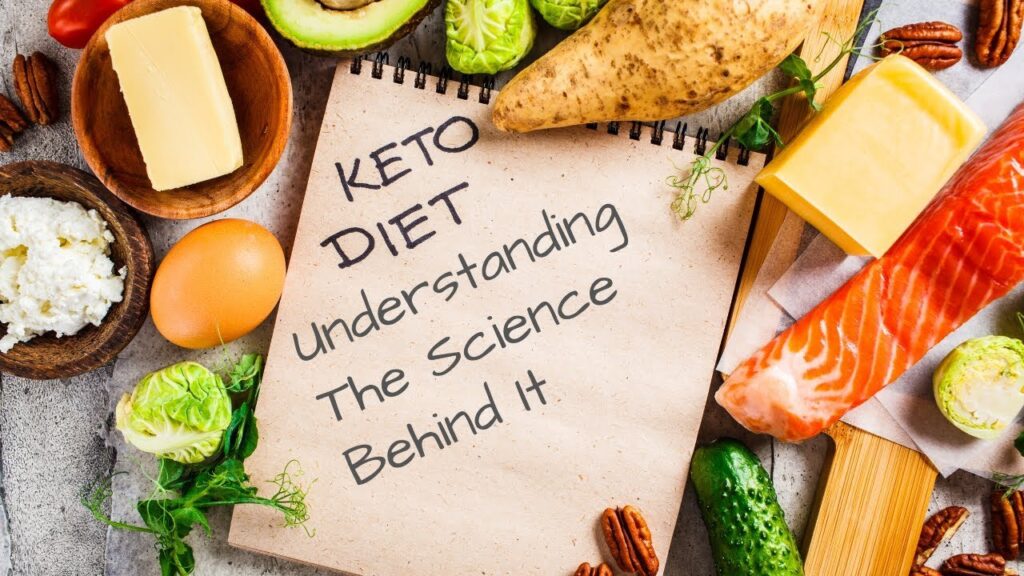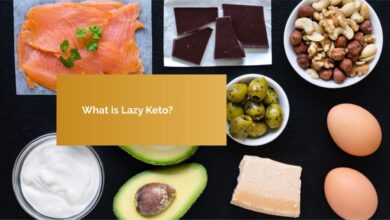
5 Key Facts About the Science of the Keto Diet .Before you can appreciate the deep science, you need to grasp the fundamentals. The ketogenic (keto) diet is a high-fat, moderate-protein, and very low-carb eating plan
- Why understanding the keto diet matters today
- How keto stands apart from other diet trends
- Quick overview of the science behind keto
Understanding What the Keto Diet Is
- Basic principles behind keto
- Macros breakdown: Fats, Proteins, and Carbs
- Goal: Achieving Ketosis
Fact 1: Ketosis – The Fat-Burning State
- What is ketosis scientifically?
- How the body shifts from glucose to ketones
- The importance of blood ketone levels
Fact 2: The Role of Insulin in Keto Success
- Insulin’s relationship to fat storage
- How lowering insulin levels promotes fat burning
- Why keto is ideal for insulin resistance
Fact 3: Keto’s Impact on Appetite Hormones
- How keto affects ghrelin and leptin
- Reduced cravings and hunger control
- Real-world studies proving appetite suppression
Fact 4: The Effect of Keto on Brain Health
- Brain’s preference for ketones
- Keto and improved cognitive functions
- Potential benefits in neurological diseases
Fact 5: Keto and Muscle Preservation
- Why keto protects lean muscle mass
- Ketone bodies and protein-sparing effects
- Comparing keto to traditional calorie-restriction diets
Common Myths About the Keto Diet
- Myth: Keto is dangerous for the heart
- Myth: Keto causes muscle loss
- Myth: Keto leads to severe nutrient deficiencies
Potential Side Effects and How to Manage Them
- The infamous “keto flu” explained
- How to balance electrolytes during the transition
- Smart strategies to adapt smoothly to keto
Best Foods to Eat on a Keto Diet
- Healthy fats and their importance
- Low-carb veggies and fiber sources
- Keto-friendly proteins and dairy
Top Mistakes People Make on the Keto Diet
- Overeating “keto junk food”
- Not eating enough vegetables
- Ignoring electrolyte balance
How to Know If You’re in Ketosis
- Measuring ketone levels: Blood, Breath, and Urine
- Physical signs of ketosis
- Best practices for staying consistently in ketosis
Keto Diet vs. Other Low-Carb Diets
- Keto vs Atkins: What’s the difference?
- Keto vs Paleo: Key distinctions
- Which one is right for you?
Who Should and Shouldn’t Try the Keto Diet
- Ideal candidates for keto
- Situations where caution is needed
- Always consult a healthcare provider
Conclusion
- Summary of keto’s scientific foundations
- Why understanding the science can lead to better results
FAQs
- Is keto safe long-term?
- Can keto help with type 2 diabetes?
- Will I lose muscle on keto?
- How quickly can you enter ketosis?
- What happens if I eat carbs on keto
Introduction
Have you ever wondered why the keto diet exploded into one of the most popular health trends today? It’s more than just a fad or another quick-fix plan. Unlike countless diet gimmicks, keto is firmly rooted in fascinating, real scientific principles. And when you dig into the “why” behind keto, it becomes clear why so many people swear by its effectiveness for weight loss, energy, brain function, and even disease prevention.
The truth is, understanding the science of the keto diet isn’t just for nutrition nerds. If you’re considering trying keto (or maybe you’re already a few weeks in), having a strong grasp of how it actually works can mean the difference between success and failure. It’s like trying to drive a car without knowing how the gas pedal and brakes function. You might get somewhere eventually, but the journey will be way bumpier than it needs to be!
Let’s dive into the real science behind keto—simple, easy-to-grasp facts that will empower you to make the most out of your keto journey.
Understanding What the Keto Diet Is
Before you can appreciate the deep science, you need to grasp the fundamentals. The ketogenic (keto) diet is a high-fat, moderate-protein, and very low-carb eating plan. Its goal? To shift your body’s main fuel source from carbohydrates to fat.
Most people consume a diet rich in carbs—think bread, pasta, rice, and sugary snacks. When you eat carbs, your body converts them into glucose, your primary energy source. But here’s the kicker: any glucose your body doesn’t immediately need for energy gets stored as fat. That’s why a high-carb diet often leads to weight gain.
Keto flips that script. By drastically reducing carb intake (usually to about 20-50 grams of net carbs per day), your body burns through its glycogen stores and switches to burning fat for energy instead. This metabolic state is called ketosis. In ketosis, your liver breaks down fats into molecules called ketones, which then serve as the new energy source for your body and brain.
The macro breakdown usually looks like this:
- 70-75% fats
- 20-25% proteins
- 5-10% carbs
By dramatically lowering carbs and elevating fat intake, you guide your body into a fat-burning machine. Sounds exciting, right? Now, let’s get into the five powerful scientific facts that truly set the keto diet apart.
5 Key Facts About the Science of the Keto Diet
Fact 1: Ketosis – The Fat-Burning State

Ketosis is the cornerstone of the keto diet, and it’s what makes this eating plan so unique. But what exactly is ketosis, and why should you care?
In its simplest form, ketosis is a metabolic state where your body shifts from burning glucose (derived from carbs) to burning fat as its primary energy source. This shift doesn’t just happen overnight—it’s the result of consistently following a strict low-carb diet, which forces your body to start using stored fat for energy. But how does this process actually work?
When you eat a high-carb meal, your body breaks those carbohydrates down into glucose. This glucose enters the bloodstream, which prompts the release of insulin. Insulin helps regulate blood sugar levels and stores excess glucose as fat. However, when you drastically reduce your carb intake, your body runs low on glucose and begins to seek alternative fuel sources. This is when the liver kicks in, breaking down fats into ketones, which are then released into the bloodstream to supply energy to the brain and muscles.
How the Body Shifts to Ketones
The body’s ability to create ketones is vital to its adaptation to ketosis. Ketones are byproducts of fat metabolism, produced when the liver breaks down fats for energy. There are three primary types of ketones: acetone, acetoacetate, and beta-hydroxybutyrate (BHB). Of these, BHB is the main ketone used by the brain and body for energy. When your body enters ketosis, BHB levels rise, providing a constant source of energy, and you begin to burn fat instead of glucose for fuel.
The Importance of Blood Ketone Levels
To confirm that you’ve entered ketosis, measuring the ketone levels in your blood is the most accurate way. A blood ketone meter can help you track this and give you a clearer picture of your progress. When your blood ketone levels rise above 0.5 mmol/L, it typically indicates that you are in a mild to moderate state of ketosis. Ketones can also be measured through breath and urine tests, but these are less precise.
Entering ketosis takes time. For many people, it can take anywhere from a few days to a few weeks to adapt to this new energy system, depending on factors like the severity of carb restriction and activity levels. This adaptation period is often associated with the “keto flu,” a group of symptoms that may include fatigue, dizziness, headaches, and irritability as the body adjusts to burning fat for fuel instead of carbs.
In summary:
Ketosis is the process by which your body switches from using glucose to burning fat for energy. This is the metabolic state that makes the keto diet effective for fat loss. Ketones, produced during ketosis, serve as the main energy source, helping you stay energized while simultaneously burning fat.
Fact 2: The Role of Insulin in Keto Success
One of the key reasons the keto diet is effective for weight loss and managing insulin resistance is its ability to lower insulin levels. Insulin is a hormone produced by the pancreas, primarily responsible for regulating blood sugar levels. After you consume carbohydrates, your body breaks them down into glucose, which raises blood sugar levels. In response, your pancreas releases insulin to help shuttle glucose into cells for energy or storage.
Insulin and Fat Storage
When insulin levels are high, your body stores fat more readily. Insulin is essentially a storage hormone, promoting the storage of excess glucose in the form of fat, especially around the abdominal area. High insulin levels also inhibit the release of fat from fat cells, making it difficult for your body to access stored fat for energy. This is why chronic high insulin levels are closely linked to obesity and metabolic diseases like type 2 diabetes.
By drastically reducing carbohydrate intake on the keto diet, your body produces much less insulin. This has a twofold benefit:
- Lowering insulin levels allows your body to release fat from storage.
- The reduced insulin levels make it easier for your body to burn stored fat as fuel, rather than storing it.
How Keto Helps with Insulin Resistance
In addition to promoting fat loss, the keto diet is especially beneficial for people with insulin resistance, a condition where the body’s cells no longer respond effectively to insulin. Insulin resistance is a hallmark of type 2 diabetes, and it can make it harder to lose weight and control blood sugar levels. By reducing carb intake and lowering insulin production, the keto diet helps improve insulin sensitivity, allowing your cells to respond more effectively to insulin. Over time, this can help lower the risk of developing type 2 diabetes and improve overall metabolic health.
In summary:
Keto’s ability to lower insulin levels is key to its success. By reducing insulin, the body is able to burn fat more efficiently, helping with weight loss and improving insulin sensitivity in people with insulin resistance.
Fact 3: Keto’s Impact on Appetite Hormones
One of the most appealing benefits of the keto diet is its ability to reduce hunger. Research suggests that keto helps regulate appetite hormones, making it easier to stick to your diet without feeling constantly hungry or deprived. There are two primary hormones involved in hunger regulation: ghrelin and leptin.
How Keto Affects Ghrelin
Ghrelin, often called the “hunger hormone,” is produced in the stomach and signals to the brain that you are hungry. When you follow a high-carb diet, ghrelin levels can remain elevated, making you feel hungry more frequently. However, on the keto diet, your body produces less ghrelin, leading to fewer cravings and reduced feelings of hunger. This is a major benefit for those who struggle with appetite control on other diets.
How Keto Affects Leptin
Leptin, on the other hand, is known as the “satiety hormone.” It’s produced by fat cells and signals to the brain that you are full and should stop eating. On a high-carb diet, leptin resistance can occur, meaning that your body doesn’t respond to leptin signals as effectively, leading to overeating. The keto diet has been shown to improve leptin sensitivity, helping to regulate hunger and fullness signals more effectively. As a result, many people on keto experience less frequent hunger pangs and can go longer periods without needing to eat.
Appetite Suppression in Real-World Studies
Several studies have shown that people on the keto diet report reduced hunger and fewer cravings compared to those on other low-fat diets. In one study, participants on a keto diet consumed fewer calories, yet felt more satisfied after meals, likely due to the way keto affects ghrelin and leptin levels. This makes it easier to stick to a calorie deficit, which is essential for weight loss.
In summary:
The keto diet helps control hunger by reducing ghrelin and improving leptin sensitivity. This natural appetite suppression can make it easier to follow the diet and maintain a calorie deficit, leading to weight loss success.
Fact 4: The Effect of Keto on Brain Health
The benefits of the keto diet extend beyond weight loss and metabolic health—there’s also compelling evidence suggesting that keto can improve brain function and mental clarity. The brain is a high-energy organ that typically relies on glucose for fuel. However, during ketosis, the brain can use ketones (the byproducts of fat metabolism) as an alternative fuel source.
The Brain’s Preference for Ketones
Ketones are a more efficient fuel source for the brain compared to glucose. Unlike glucose, ketones produce less oxidative stress and are easier for the brain to process. This is why many people report feeling more mentally alert and focused after adapting to the keto diet. In fact, ketones provide a steady, consistent source of energy for the brain, reducing the energy fluctuations that can occur when the brain relies solely on glucose.
Keto and Cognitive Function
Research has also shown that the keto diet can improve cognitive performance, particularly in individuals with neurological conditions like Alzheimer’s disease, Parkinson’s disease, and epilepsy. In fact, the keto diet was originally developed in the 1920s as a treatment for epilepsy, and its neuroprotective benefits continue to be explored in modern medicine. Studies have shown that ketones can help protect brain cells from damage, reduce inflammation, and even promote neurogenesis (the growth of new neurons).
Potential Benefits in Neurological Diseases
Keto has shown promise in managing neurological diseases, particularly those that involve seizures and cognitive decline. For example, the ketogenic diet is often used as a treatment for drug-resistant epilepsy, especially in children who don’t respond to conventional treatments. Additionally, early research suggests that ketones may have therapeutic effects on Alzheimer’s and Parkinson’s disease by providing a steady energy source to the brain and reducing neuronal damage.
In summary:
The keto diet provides cognitive benefits by supplying the brain with ketones, a more efficient and protective fuel source than glucose. It has shown promise in treating neurological conditions and improving overall mental clarity.
Fact 5: Keto and Muscle Preservation
One common concern when people start a low-calorie or low-carb diet is muscle loss. When you restrict calories, the body can break down muscle tissue for energy. However, the keto diet is different from other low-carb diets in that it helps preserve muscle mass, even while promoting fat loss.
Why Keto Protects Lean Muscle Mass
The key to muscle preservation on keto lies in the diet’s ability to promote fat metabolism while maintaining adequate protein intake. Keto encourages the body to burn fat for fuel rather than muscle. Additionally, by maintaining a moderate protein intake (as opposed to very high protein, which could kick you out of ketosis), the keto diet helps prevent muscle breakdown. The presence of ketones also protects muscle tissue from being used as an energy source.
Ketone Bodies and Protein-Sparing Effects
Ketones have a protein-sparing effect, meaning they provide an alternative energy source to muscle tissue. Studies have shown that ketones reduce the breakdown of muscle proteins, allowing you to maintain lean muscle mass while losing fat. This is particularly beneficial for individuals looking to lose fat while maintaining a toned physique.
Comparing Keto to Traditional Calorie-Restriction Diets
In comparison to traditional calorie-restricted diets, the keto diet is far better at preserving lean muscle mass. While standard calorie-cutting diets typically result in both fat and muscle loss, keto’s reliance on fat for energy helps protect muscle tissue. This is why many athletes and bodybuilders have embraced keto for fat loss without sacrificing muscle.
In summary:
The keto diet helps preserve muscle mass while promoting fat loss, thanks to the protein-sparing effects of ketones. This makes it a great option for those looking to lose weight without sacrificing lean muscle tissue.
Conclusion
The keto diet is more than just a passing trend—it’s a scientifically backed approach to weight loss and overall health. From the fat-burning power of ketosis to the impact on insulin, appetite hormones, brain health, and muscle preservation, keto offers a wealth of benefits. By understanding the science behind keto, you can make better choices and truly unlock its potential for improved health and weight loss.
Read Also; How to Navigate the Science of the Keto Diet. A Must Read;
FAQs https://en.wikipedia.org/wiki/FAQ
Is keto safe long-term?
Yes, keto is safe for most people when done properly. However, it’s important to consult with a healthcare provider if you have any underlying health conditions.
Can keto help with type 2 diabetes?
Yes, keto can improve insulin sensitivity and help manage blood sugar levels, which is beneficial for people with type 2 diabetes.
Will I lose muscle on keto?
No, the keto diet helps preserve muscle mass by promoting fat burning and sparing muscle tissue through ketones.
How quickly can you enter ketosis?
It typically takes 2-4 days for your body to enter ketosis, depending on factors like carb intake and activity level.
What happens if I eat carbs on keto?
Eating too many carbs can kick you out of ketosis, causing your body to revert to burning glucose for energy instead of fat.






One Comment